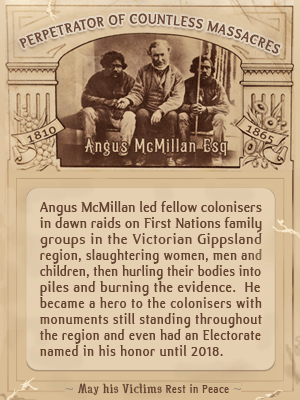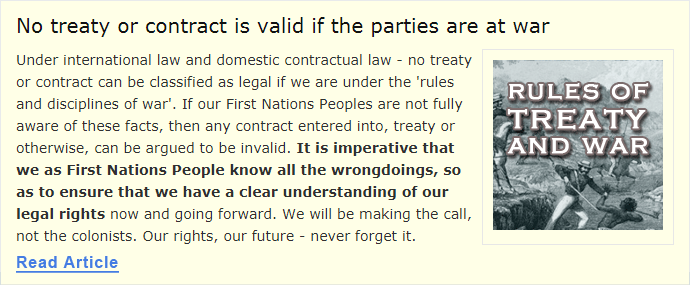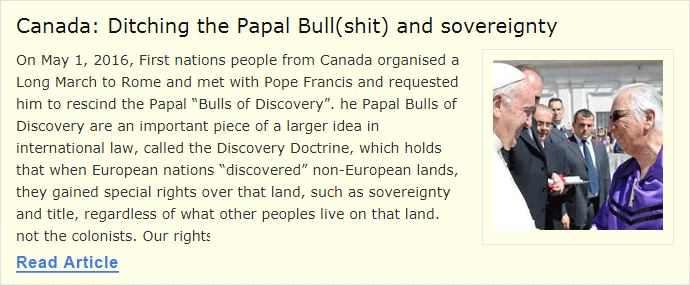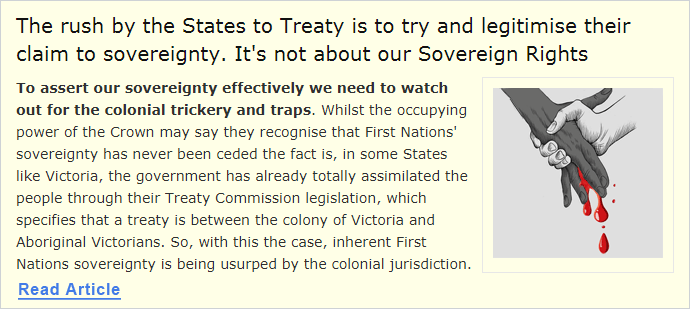Sovereignty Never Ceded: Why Treaty with a State or Territory without self-determination
Sovereignty Never Ceded: Why Treaty with a State or Territory which only holds a 'mere colour of title' over land?

The cheek these governments have - They never listen to the people, they punish anyone that needs assistance, destroy their lands and then expect people to believe they would honour an agreement.

31 January 2020
I am returning to some matters that I have highlighted in other statements. I am pleading with our Peoples to walk away from the current Treaty processes being promoted by different States and Territory. These Treaty processes are not focusing on the key issues that our Peoples have been marching for on the streets since the 1960s and 1970s. Before that the 1930s, 1940s and 1950s argument was about Equality and Civil Rights.
The Old Ones were seeking to free our Peoples from being Wards of the State. As a Ward of the State, there were no individual or collective rights to make decisions for ourselves. I am sure that our Old People knew that they were in fact prisoners of the colonial States, rounded up under the scorched earth principle to clear the way for squatters. Those who rebelled were imprisoned in the colonial institutions, called government mission stations.

Many were never released. Barry Morris, in 1989 in his book 'Domesticating Resistance: The Dhan-Gadi' identified that on the north coast of New South Wales, the squatters themselves wrote in their own diaries how they shot and killed the resisters and/or cleared the land by poisoning waterholes where Aboriginal people gathered. In Victorian Gippsland area, Angus McMillan and his horde of squatters did the same and this was repeated across the continent.
The current Australia-British historical perspective is that they simply 'settled' the land 'peacefully', which suggests that our Peoples just rolled over and gave them everything without resisting to protect their sacred heartlands. When Aboriginal People talk about Invasion Day that is not just an Aboriginal and Torres Strait Islander reflection of history, it is by definition a European concept that operated in 18th and 19th centuries.
We cannot overlook what happened in 1788, because the British written commission to Governor Phillip informed him that they had to invade the land under the Rules and Disciplines of War.
This instruction to invade was underpinned by the authority of the Catholic church through the Papal Bulls of that time, which authorised the taking of the lands of the heathens and infidels, e.g. The Bull Romanus Pontifex (Nicholas V), January 8, 1455 and The Bull Inter Caetera (Alexander VI), May 4, 1493.
The High Court in Mabo (N0.2) made it very clear that in making their decision they had to overturn precedents. By overturning these precedents, the Mabo judgement restored all property rights back to our Peoples. Unfortunately, not enough of our people understand what this truly means, property rights that is, real estate.
Former Prime Minister John Howard and his cohorts knew exactly what was missing in a colonial legal sense after this judgement was made. Howard made up a big story about a Ten Point Plan. This Ten Point Plan only focused on one issue, the questionable validity of the Crown's land tenure, where the Mabo judgement at paragraph 83 stated that:
- Where the Crown has validly alienated land by granting an interest that is wholly or partially inconsistent with a continuing right to enjoy native title, native title is extinguished to the extent of the inconsistency. Thus native title has been extinguished by grants of estates of freehold or of leases but not necessarily by the grant of lesser interests (e.g., authorities to prospect for minerals).
- Where the Crown has validly and effectively appropriated land to itself and the appropriation is wholly or partially inconsistent with a continuing right to enjoy native title, native title is extinguished to the extent of the inconsistency. Thus native title has been extinguished to parcels of the waste lands of the Crown that have been validly appropriated for use (whether by dedication, setting aside, reservation or other valid means) and used for roads, railways, post offices and other permanent
What then constitutes a valid act?
Howard cleverly wrote into the Native Title Act as amended in 1998 the need for Indigenous Land Use Agreements (ILUAs). These Indigenous Land Use Agreements are mere contracts. Within that contract there are three key elements that are not emphasised, nor are they explained fully to Native Title claimants. As Native Title claimants by lawyers who supposedly represent First Nation's interests. As Native Title claimants lawyers are supposed to represent YOUR and rights interests. The three aspects that our people don't know the true meaning of are:
-
Validate all Past Acts.
On this issue the Native Title Act can only go back to 1975, when the Racial Discrimination Act became law in Australia. So, people, when you sign that Indigenous Land Use Agreement you validate all government acts in relation to the land tenures that the invaders established between then and now. If our people were diligent enough to look at State and Territory law, you will see the enormous amount of legislation that was amended in respect of land tenure in each State and Territory, to circumvent Native Title rights and interests without just terms compensation. -
Surrender.
So, what does surrender truly mean in the context of the Native Title Act? They are asking you to surrender all future claims against the Crown and you are being asked to forgive them for past wrongdoings and therefore surrender claims against the colonialists and the modern States. If you agree to this, you are denying yourself and future generations the rightful compensation, reparation and restitution that is owed. By agreeing to surrender you are also handing over the land itself to the colonial power without just terms compensation. -
Future Acts to be classified and Past Acts
This means that you have surrendered all your rights for development to local government, States government, mining companies and/or others in the future without the right of veto, nor a right to negotiate and further compensation. Surrendering allows the Future Acts to take place without any consideration of your rights.
If our people do not understand this, then heaven forbid what is coming in the Treaties with States and Territories!
I just simply ask our people to think for themselves and stand their ground if they do not understand the consequences and possible ramifications on their Nation and their Peoples if they agree. Money alone, no matter how much is offered will not restore that which is lost. Always remember, any negotiations of this kind should not be about what you can personally get now for yourself, but rather creating a future for your grandchildrens' grandchildren. Do not allow the politics of poverty and personal whims of need to stand in the way of common sense. We cannot, and I emphasise cannot permit ourselves to be led by the assimilated newly-trained Black Trackers. Just look at what they gave us when the so-called team of Black experts were brought in by the Keating government to negotiate the Native Title Act.
These modern-day educated two-bob Black Trackers are trained, just as they trained the original Black Trackers to shoot their own people. When those Black Trackers finished their job for the Crown they went back to their own mob and lived in poverty for the rest of their lives, obeying the white rule because they knew the power of the gun. Circumstances have changed, however, where these modern-day two-bob Black Trackers have now become part of the Black elite purposefully established by a strategy developed by the late H. C. 'Nugget' Coombs.
Surely, our people can see history repeating itself now?
Let it be understood, First Nations Law is the Law of the Land and the colonialists know it. The British law that came with the invaders was a foreign law belonging to a foreign country and was supplanted here solely to protect the interests of the British subjects only, against our Peoples' rebuttals, and forced upon us through the power of the gun. These imported laws that came with the British subjects did not relate to our Peoples then or now; nor have legal jurisdiction, civil or otherwise, over our Peoples; never have and never will. I suggest that these foreign laws and jurisdiction will only apply to First Nations Peoples if you consent to that jurisdiction through a Treaty.
When and if any if our First Nations Peoples you sign a Treaty with a State or Territory always be mindful of the fact that the Mabo judgement held that there are only three ways in which a Nation already occupied by Peoples can be lawfully acquired:
- International law recognized conquest, cession, and occupation of territory that was terra nullius as three of the effective ways of acquiring sovereignty. No other way is presently relevant…
Ref: Mabo v Queensland (No 2) ("Mabo case") [1992] HCA 23; (1992) 175 CLR 1 (3 June 1992)Ref: Mabo v Queensland (No 2) ("Mabo case") [1992] HCA 23; (1992) 175 CLR 1 (3 June 1992)
It is also important to clearly understand that the international law at the time and now holds unequivocally that the laws of the ancient kingdom remain in force, until otherwise altered through negotiation by the conquerors in the case of a conquered colony. But our people were never engaged in a declared war against the British colonisers. We have never been defeated, nor conquered.
In the New South Wales Supreme Court, Justice Willis ruled the Aboriginal Peoples remain unconquered.
“But the frequent conflicts that have occurred between the colonists and the Aborigines within the limits of the colony of New South Wales make it, I think, sufficiently manifest that the Aboriginal tribes are neither a conquered people, nor have tacitly acquiesced in the supremacy of the settlers."
…
"I repeat that I am not aware of any express enactment or treaty subjecting the Aborigines of this colony to the English colonial law, and I have shown that the Aborigines cannot be considered as Foreigners in a Kingdom which is their own."R v Bonjon. 1841
The purpose of these treaties is solely to settle this ongoing conflict. But we must be very careful. if Nations to agree to pursue Treaty negotiations, then we must ensure that we are classified as equal parties in any negotiations because you are leaders of a sovereign State. The notion of Treaties is to transfer elements of your sovereignty to the occupying State power and authority and represents your authority to be ruled by them on their terms.
If you do not have people in your negotiating team sufficiently educated in the English and latin languages, and understanding the English concepts of the chosen words, then you will end up with a lop-sided treaty that can and will be used against your Peoples in the future.
We are sovereign Nations and Peoples and we are the ones who make the decisions without any influence such as – 'if you don't take it now you will not get another chance'. This type of language is illegal and is criminally coercive. It is the colonialists who want to end the conflict. Their efforts are to establish their legitimacy on and within these lands.
Ironically enough, Australians who invite other foreign nationals into our Country make very big issues of Australian customs and law and argue that emigrants should not bring their laws and customs to Australia, which is contrary to what the British argued when they arrived here. The British argued that they were not subject to the Law of the Land when they arrived, because where an Englishman goes the English law follows, but it seems that that only applies to the English.
Mabo changed the status quo. Whether Australians like it or not there are two regimes operating today in Australia: The Law of the Land belonging to Sovereign First Nations and Peoples under our own Laws and customs and the imposed colonial system originating from a foreign jurisdiction, Britain.
On land tenure and civil jurisprudence, colonial Australia is found wanting. The rule of international law at the time, and now, respects the continuing sovereignty of Nations and Peoples and in respect to Aboriginal and Torres Strait Islanders our Law and customs continue to be paramount within this continent.
Dr. Gary Lilienthal and Dr. Nehaluddin Ahmad argue in their paper entitled 'Colonial land title in Australia: a meta-legal critical inquiry' that Australia does not have any legal land tenure and, at best, holds a 'mere colour of title' due to the 'murderous land grab' that the subsequent register of Torrens Title is incapable of rectifying.
The entire colonial English system of land law rested on a doctrine virtually indistinguishable from the over-turned Regalian doctrine, dismembered by Holmes for its inherent capriciousness. Further, introducing a foreign legal custom to a new land would always fail for lack of prescription. Torrens title was an attempt to cure defects in customary title that had subsisted since ancient Anglo-Saxon times in England – but never in Australia. The prospect of mal- administration of the register would make the object of Torrens title difficult to achieve. In Australia, the crown had tried to introduce English custom in Australia as local law, by ceremony and persuasion, to blur the realities of their murderous land grab. However, they did it by committing egregious wrongs defeating the introduction of their customs, and thus, their acquisition of allodial title to Australian lands was sufficiently defective to reduce their holdings to mere colour of title. The mala fides involved in their attempts at land acquisition would defeat any claim to convert their colour of title into a successful claim for adverse possession.
NB 'Regalian doctrine' refers to the Crown's feudal land grants
Ref: Commonwealth Law Bulletin, 2019, pp. 1-26
Vol. 0, No. 0, 1–26, https://doi.org/10.1080/03050718.2019.1634610
Thus freehold title is incapable of extinguishing Native Title and so are all the land tenures exhaustively listed in the Native Title Act's Schedule 1 – 'Scheduled Interests'. The only power that the Australian governments have over us is the through the power of the gun and the police.
The way in which the British have deceived people all these years was described by Pierre Clastre, the French anthropologist, who exposed how the Spanish and Portuguese criminalised '##otherness' in South America. The British, through their practice, stole this concept. Dr Gary Lilienthal, Wang Shi Qi and Dr Nehaluddin Ahmad published a paper in Commonwealth Law Bulletin in 2020 entitled The treatment of Chinese customary Law in British colonial Hong Kong, in which they examine the British necessity to invoke the concept of 'othering' in order to assert colonial power:
To consider here the concept of othering the stability of a European colony had always required enunciation of the rhetoric of culture subordination of the non-white other, so they can be transformed into the native subaltern.1 In this way, they became a colonised people by, to the ears of the European metropolitan audience, apparently freely permitting exploitation of their lands, labour and natural resources. Thus, the so-called practice of othering justified the already established facts of domination and subordination of native peoples. It degraded them, from citizen to subject, and then displaced them from the periphery of the colonial imperialists' body politic.2 The stark irony of the claim of othering Hong Kong's British common law legal system suggest a research objective of examining critically any historical relationship between Chinese and British law in Hong Kong.
It is likely that both Imperial and later China viewed their 19th century treaties with Western powers as 'unequal', because Chinese officials were not treated as equal negotiators. Rather, under the duress of war, the Imperial Qing government was forced to agree to western encroachment on China's sovereign rights. These intrusions arguably reduced Imperial China to a form of colonial status. The earliest of the unequal agreements was in the negotiations of the 1841 Convention of Chuenpi, … , during the first of the Opium Wars. Imperial China and Great Britain signed the first of these unequal treaties, in 1842, designated as the Treaty of Nanjing.3
Commonwealth Law Bulletin, 2020, pp. 1-24.
https://doi.org/10.1080/03050718.2020.1714457 (for purchase)
Having drawn the parallels, I just simply ask our mob to look at what the modern two-bob lack Trackers did in their negotiations on the Native Title Act, without them realising it they approved an act of parliament that is absolutely racially discriminatory and taking away all those civil and citizen rights that our Peoples have been fighting for since the time of invasion.
Currently, Australia does not have the ability to be truthful and honest. Even the universities are dictated to by the political whim of the day and do not teach the true history of this continent. They do not teach the basic fundamentals and the true repercussions for the Australian legal system when Mabo recognised Aboriginal Law and customs. If ever there was a need to target a starting point for open and truthful discussions one would think that the universities would be the first port of call, especially the history and law faculties. But, of course, these institutions are controlled by the government. I know this from first hand experience, because when Robert Tickner was the Minister for Aboriginal Affairs (1990-1996) he wrote to the Pro Vice-Chancellor of the University of Newcastle, enquiring as to what subjects I was teaching, as well wanting to be briefed on the content of my lectures. Consequently, the Pro Vice Chancellor ordered that I was not to be offered a tenured position as a lecturer, in preference to keeping the Aboriginal money flowing into the university.
Such is the evil that continues within the illegal Australian colonial administration. If the truth be known the Australian colonial governments State and Federal know that they are on a losing side. They do not have legitimate land tenure, instead all the land tenures are 'mere colour of title'.
As Nations and Peoples, we need to stand strong and firm in our commitment to get it right, to assert our sovereign rights. We owe it to our future generations.
Stand strong for your Homelands and sovereign rights against the newborn resurrected two-bob Black Trackers, agents of the coloniser.
 Contact: Ghillar Michael Anderson
Contact: Ghillar Michael AndersonConvenor of the Sovereign Union,
Head of State of the Euahlayi Peoples Republic
Contact Details here
References:
1. ‘The colonial masters’ other, displaced to society’s margins without human agency. Robert J C Young, Postcolonialism: A Very Short Introduction (Oxford University Press 2003).
2. B Ashcroft, G Griffiths and H Tiffin, Post-Colonial Studies: The Key Concepts (Routledge 1998) 142.
3. Immanuel C Y Hsu, The Rise of Modern China (Oxford University Press 1970) 239.




